Race, Ethnicity, and Migration in the UK: A 1992-1997 Analysis
VerifiedAdded on 2023/01/12
|15
|4445
|50
Report
AI Summary
This report delves into the intricate relationship between race, ethnicity, and migration within the United Kingdom, focusing on the period from 1992 to 1997, a time marked by significant shifts due to Britain's entry into the European Union. The report begins with an examination of the historical context of migration in the UK, including the impact of the Windrush generation, the Hungarian Revolution, and the Immigration Act of 1971. It then explores theoretical frameworks, such as Ravenstein's Laws of Migration, to understand migration patterns. The report analyzes the causes of migration, including the free movement of EU citizens, and discusses the controversies surrounding race, ethnicity, and immigration, addressing the roles of media and political narratives. Furthermore, it evaluates the impacts of policies, practices, and media debates, including the impact of the New Labour government, refugee crises, and the perception of threats to national identity. The report provides recommendations and concludes with a synthesis of the key findings, emphasizing the complex and evolving nature of migration within the UK context.
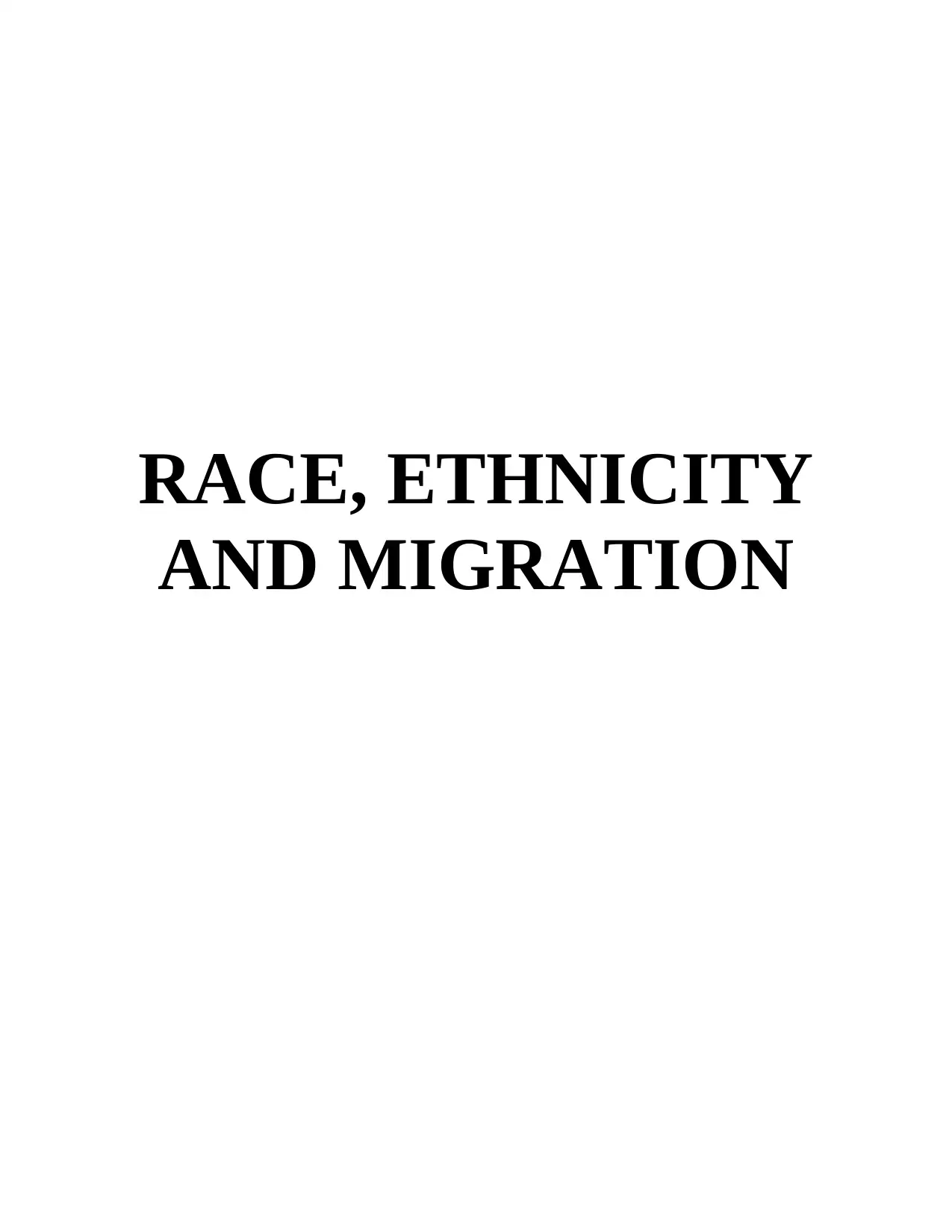
RACE, ETHNICITY
AND MIGRATION
AND MIGRATION
Paraphrase This Document
Need a fresh take? Get an instant paraphrase of this document with our AI Paraphraser
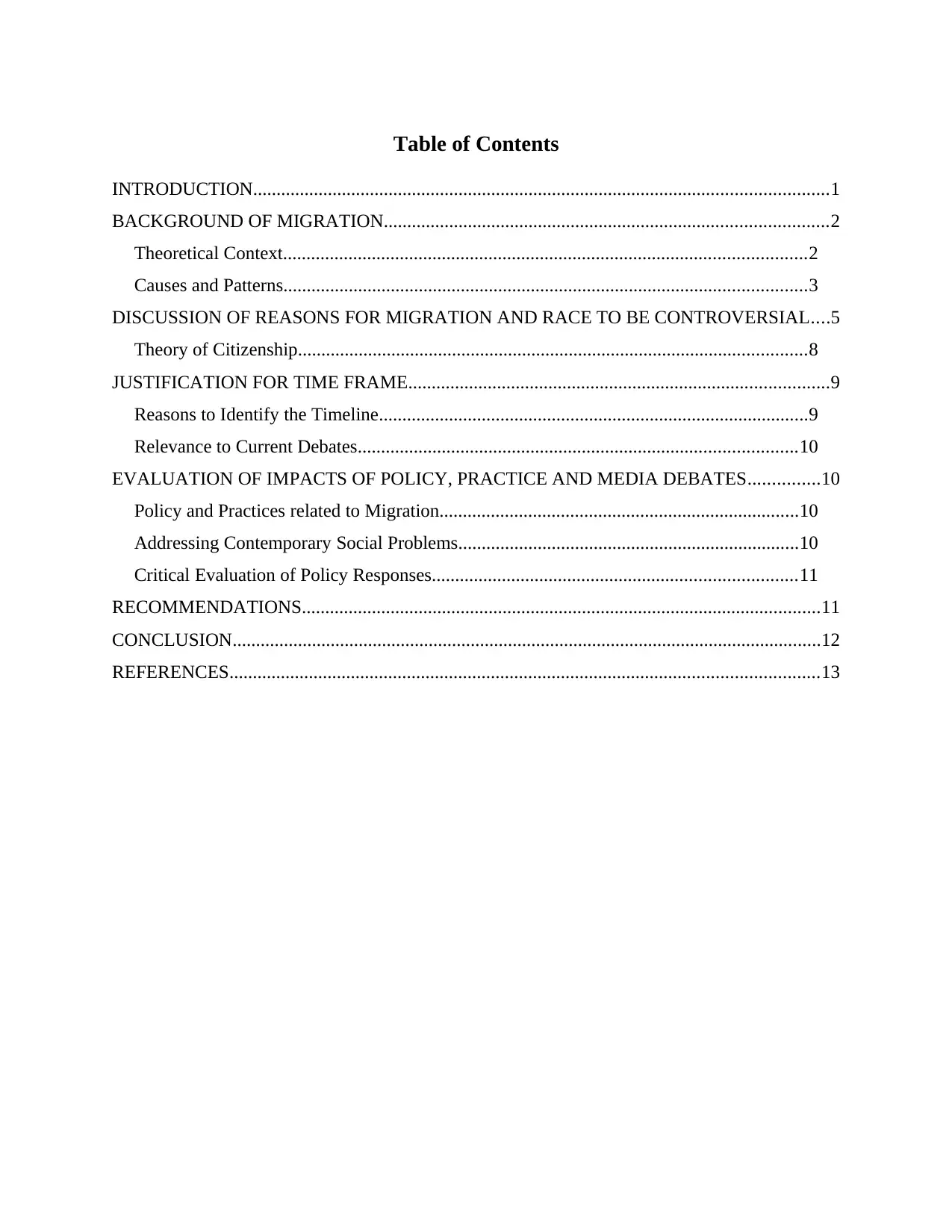
Table of Contents
INTRODUCTION...........................................................................................................................1
BACKGROUND OF MIGRATION...............................................................................................2
Theoretical Context................................................................................................................2
Causes and Patterns................................................................................................................3
DISCUSSION OF REASONS FOR MIGRATION AND RACE TO BE CONTROVERSIAL....5
Theory of Citizenship.............................................................................................................8
JUSTIFICATION FOR TIME FRAME..........................................................................................9
Reasons to Identify the Timeline............................................................................................9
Relevance to Current Debates..............................................................................................10
EVALUATION OF IMPACTS OF POLICY, PRACTICE AND MEDIA DEBATES...............10
Policy and Practices related to Migration.............................................................................10
Addressing Contemporary Social Problems.........................................................................10
Critical Evaluation of Policy Responses..............................................................................11
RECOMMENDATIONS...............................................................................................................11
CONCLUSION..............................................................................................................................12
REFERENCES..............................................................................................................................13
INTRODUCTION...........................................................................................................................1
BACKGROUND OF MIGRATION...............................................................................................2
Theoretical Context................................................................................................................2
Causes and Patterns................................................................................................................3
DISCUSSION OF REASONS FOR MIGRATION AND RACE TO BE CONTROVERSIAL....5
Theory of Citizenship.............................................................................................................8
JUSTIFICATION FOR TIME FRAME..........................................................................................9
Reasons to Identify the Timeline............................................................................................9
Relevance to Current Debates..............................................................................................10
EVALUATION OF IMPACTS OF POLICY, PRACTICE AND MEDIA DEBATES...............10
Policy and Practices related to Migration.............................................................................10
Addressing Contemporary Social Problems.........................................................................10
Critical Evaluation of Policy Responses..............................................................................11
RECOMMENDATIONS...............................................................................................................11
CONCLUSION..............................................................................................................................12
REFERENCES..............................................................................................................................13
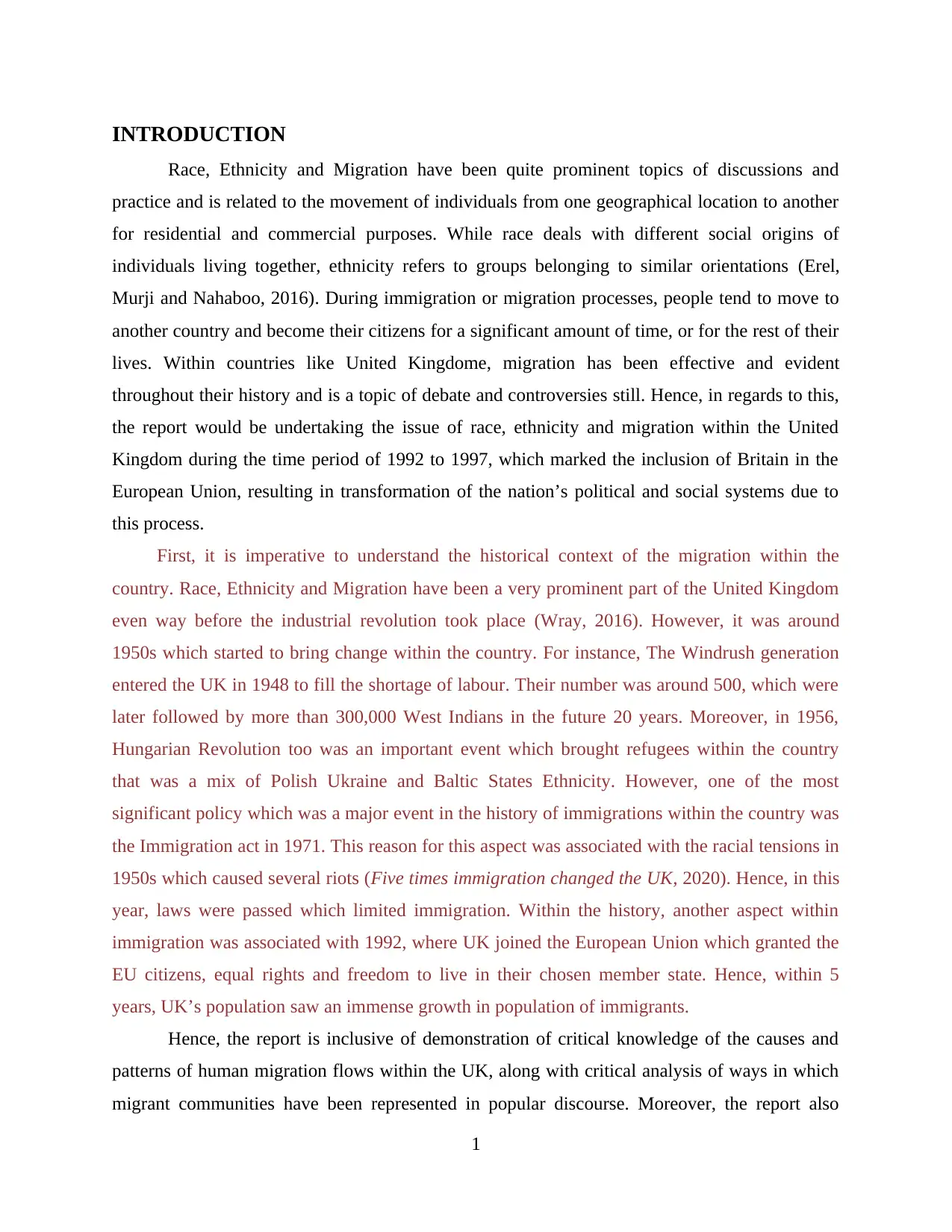
INTRODUCTION
Race, Ethnicity and Migration have been quite prominent topics of discussions and
practice and is related to the movement of individuals from one geographical location to another
for residential and commercial purposes. While race deals with different social origins of
individuals living together, ethnicity refers to groups belonging to similar orientations (Erel,
Murji and Nahaboo, 2016). During immigration or migration processes, people tend to move to
another country and become their citizens for a significant amount of time, or for the rest of their
lives. Within countries like United Kingdome, migration has been effective and evident
throughout their history and is a topic of debate and controversies still. Hence, in regards to this,
the report would be undertaking the issue of race, ethnicity and migration within the United
Kingdom during the time period of 1992 to 1997, which marked the inclusion of Britain in the
European Union, resulting in transformation of the nation’s political and social systems due to
this process.
First, it is imperative to understand the historical context of the migration within the
country. Race, Ethnicity and Migration have been a very prominent part of the United Kingdom
even way before the industrial revolution took place (Wray, 2016). However, it was around
1950s which started to bring change within the country. For instance, The Windrush generation
entered the UK in 1948 to fill the shortage of labour. Their number was around 500, which were
later followed by more than 300,000 West Indians in the future 20 years. Moreover, in 1956,
Hungarian Revolution too was an important event which brought refugees within the country
that was a mix of Polish Ukraine and Baltic States Ethnicity. However, one of the most
significant policy which was a major event in the history of immigrations within the country was
the Immigration act in 1971. This reason for this aspect was associated with the racial tensions in
1950s which caused several riots (Five times immigration changed the UK, 2020). Hence, in this
year, laws were passed which limited immigration. Within the history, another aspect within
immigration was associated with 1992, where UK joined the European Union which granted the
EU citizens, equal rights and freedom to live in their chosen member state. Hence, within 5
years, UK’s population saw an immense growth in population of immigrants.
Hence, the report is inclusive of demonstration of critical knowledge of the causes and
patterns of human migration flows within the UK, along with critical analysis of ways in which
migrant communities have been represented in popular discourse. Moreover, the report also
1
Race, Ethnicity and Migration have been quite prominent topics of discussions and
practice and is related to the movement of individuals from one geographical location to another
for residential and commercial purposes. While race deals with different social origins of
individuals living together, ethnicity refers to groups belonging to similar orientations (Erel,
Murji and Nahaboo, 2016). During immigration or migration processes, people tend to move to
another country and become their citizens for a significant amount of time, or for the rest of their
lives. Within countries like United Kingdome, migration has been effective and evident
throughout their history and is a topic of debate and controversies still. Hence, in regards to this,
the report would be undertaking the issue of race, ethnicity and migration within the United
Kingdom during the time period of 1992 to 1997, which marked the inclusion of Britain in the
European Union, resulting in transformation of the nation’s political and social systems due to
this process.
First, it is imperative to understand the historical context of the migration within the
country. Race, Ethnicity and Migration have been a very prominent part of the United Kingdom
even way before the industrial revolution took place (Wray, 2016). However, it was around
1950s which started to bring change within the country. For instance, The Windrush generation
entered the UK in 1948 to fill the shortage of labour. Their number was around 500, which were
later followed by more than 300,000 West Indians in the future 20 years. Moreover, in 1956,
Hungarian Revolution too was an important event which brought refugees within the country
that was a mix of Polish Ukraine and Baltic States Ethnicity. However, one of the most
significant policy which was a major event in the history of immigrations within the country was
the Immigration act in 1971. This reason for this aspect was associated with the racial tensions in
1950s which caused several riots (Five times immigration changed the UK, 2020). Hence, in this
year, laws were passed which limited immigration. Within the history, another aspect within
immigration was associated with 1992, where UK joined the European Union which granted the
EU citizens, equal rights and freedom to live in their chosen member state. Hence, within 5
years, UK’s population saw an immense growth in population of immigrants.
Hence, the report is inclusive of demonstration of critical knowledge of the causes and
patterns of human migration flows within the UK, along with critical analysis of ways in which
migrant communities have been represented in popular discourse. Moreover, the report also
1
⊘ This is a preview!⊘
Do you want full access?
Subscribe today to unlock all pages.

Trusted by 1+ million students worldwide
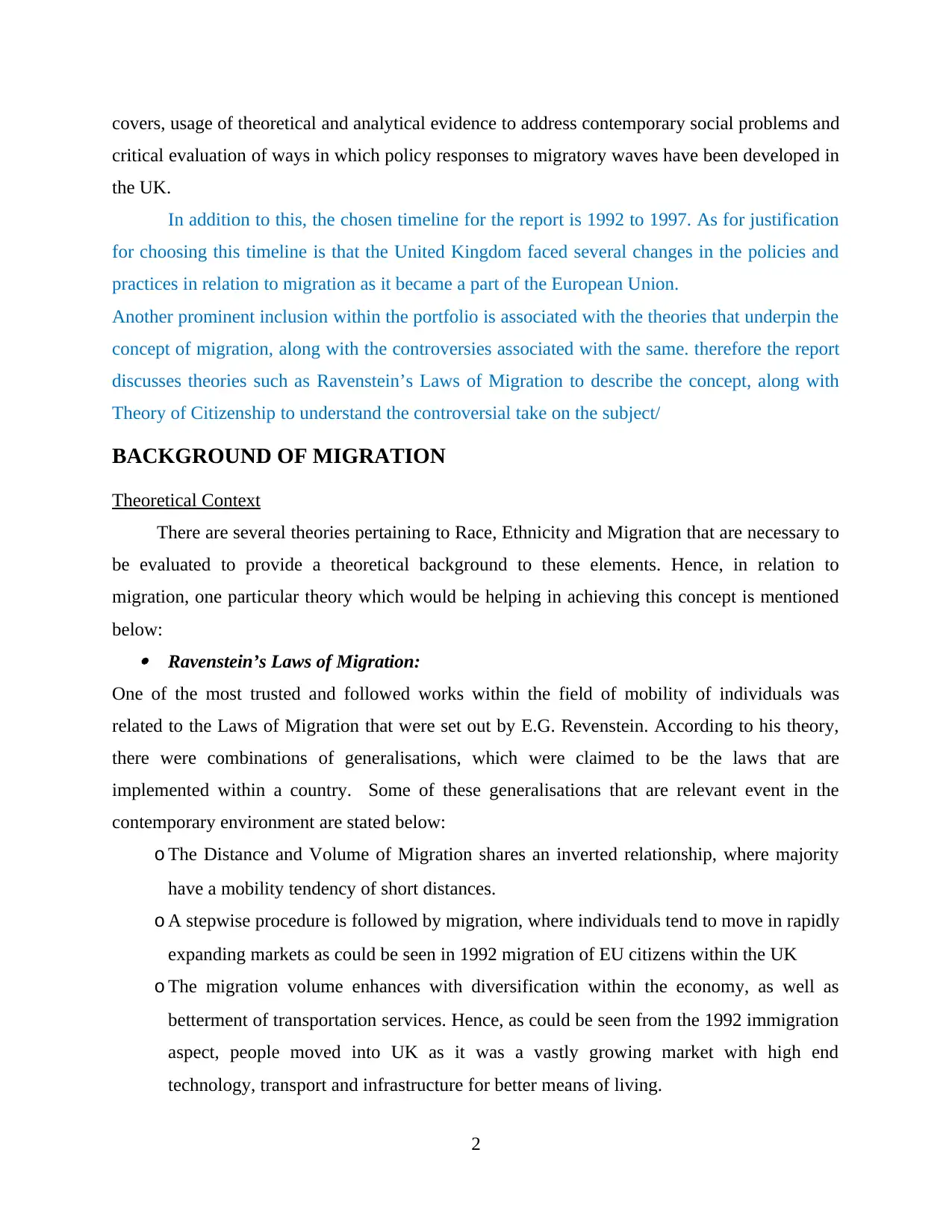
covers, usage of theoretical and analytical evidence to address contemporary social problems and
critical evaluation of ways in which policy responses to migratory waves have been developed in
the UK.
In addition to this, the chosen timeline for the report is 1992 to 1997. As for justification
for choosing this timeline is that the United Kingdom faced several changes in the policies and
practices in relation to migration as it became a part of the European Union.
Another prominent inclusion within the portfolio is associated with the theories that underpin the
concept of migration, along with the controversies associated with the same. therefore the report
discusses theories such as Ravenstein’s Laws of Migration to describe the concept, along with
Theory of Citizenship to understand the controversial take on the subject/
BACKGROUND OF MIGRATION
Theoretical Context
There are several theories pertaining to Race, Ethnicity and Migration that are necessary to
be evaluated to provide a theoretical background to these elements. Hence, in relation to
migration, one particular theory which would be helping in achieving this concept is mentioned
below: Ravenstein’s Laws of Migration:
One of the most trusted and followed works within the field of mobility of individuals was
related to the Laws of Migration that were set out by E.G. Revenstein. According to his theory,
there were combinations of generalisations, which were claimed to be the laws that are
implemented within a country. Some of these generalisations that are relevant event in the
contemporary environment are stated below:
o The Distance and Volume of Migration shares an inverted relationship, where majority
have a mobility tendency of short distances.
o A stepwise procedure is followed by migration, where individuals tend to move in rapidly
expanding markets as could be seen in 1992 migration of EU citizens within the UK
o The migration volume enhances with diversification within the economy, as well as
betterment of transportation services. Hence, as could be seen from the 1992 immigration
aspect, people moved into UK as it was a vastly growing market with high end
technology, transport and infrastructure for better means of living.
2
critical evaluation of ways in which policy responses to migratory waves have been developed in
the UK.
In addition to this, the chosen timeline for the report is 1992 to 1997. As for justification
for choosing this timeline is that the United Kingdom faced several changes in the policies and
practices in relation to migration as it became a part of the European Union.
Another prominent inclusion within the portfolio is associated with the theories that underpin the
concept of migration, along with the controversies associated with the same. therefore the report
discusses theories such as Ravenstein’s Laws of Migration to describe the concept, along with
Theory of Citizenship to understand the controversial take on the subject/
BACKGROUND OF MIGRATION
Theoretical Context
There are several theories pertaining to Race, Ethnicity and Migration that are necessary to
be evaluated to provide a theoretical background to these elements. Hence, in relation to
migration, one particular theory which would be helping in achieving this concept is mentioned
below: Ravenstein’s Laws of Migration:
One of the most trusted and followed works within the field of mobility of individuals was
related to the Laws of Migration that were set out by E.G. Revenstein. According to his theory,
there were combinations of generalisations, which were claimed to be the laws that are
implemented within a country. Some of these generalisations that are relevant event in the
contemporary environment are stated below:
o The Distance and Volume of Migration shares an inverted relationship, where majority
have a mobility tendency of short distances.
o A stepwise procedure is followed by migration, where individuals tend to move in rapidly
expanding markets as could be seen in 1992 migration of EU citizens within the UK
o The migration volume enhances with diversification within the economy, as well as
betterment of transportation services. Hence, as could be seen from the 1992 immigration
aspect, people moved into UK as it was a vastly growing market with high end
technology, transport and infrastructure for better means of living.
2
Paraphrase This Document
Need a fresh take? Get an instant paraphrase of this document with our AI Paraphraser
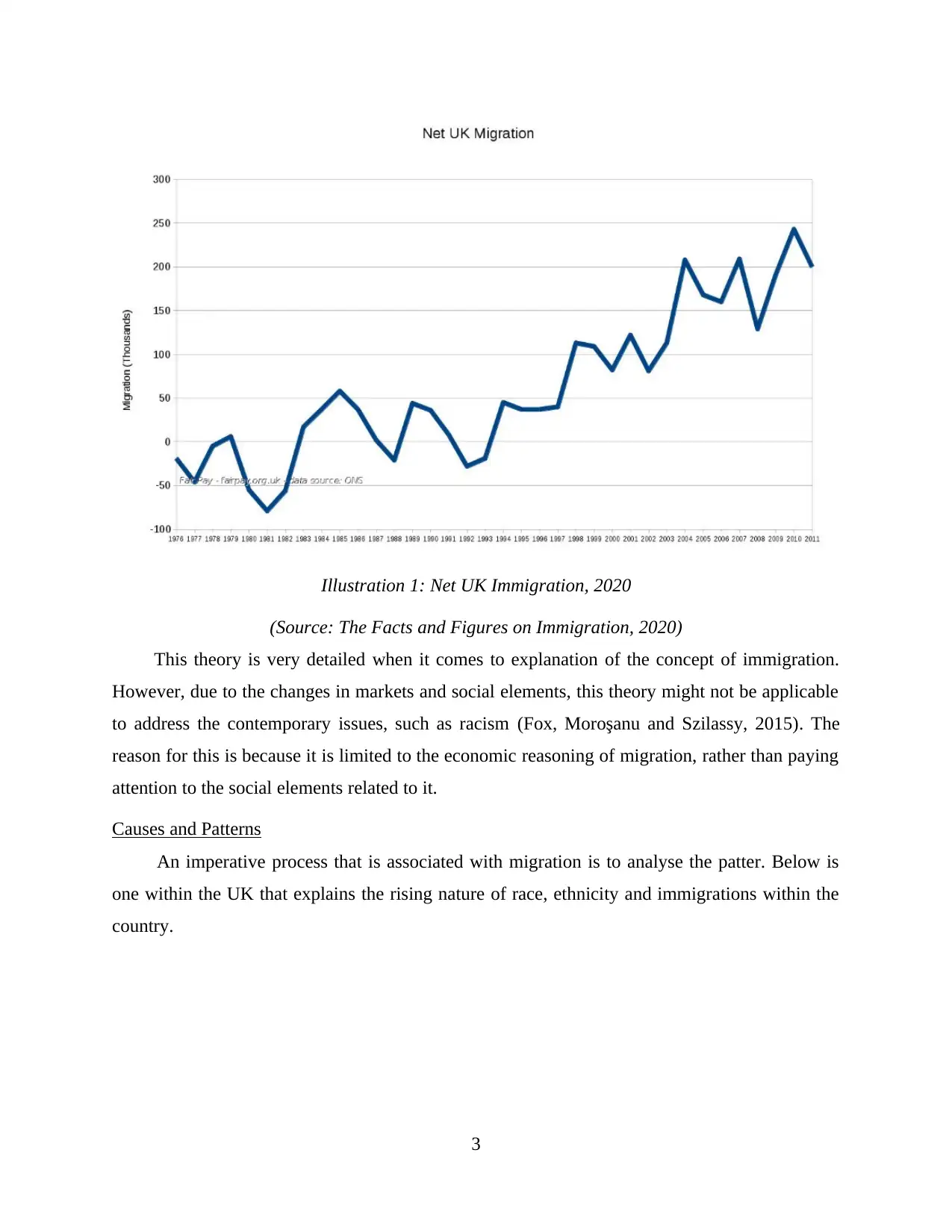
Illustration 1: Net UK Immigration, 2020
(Source: The Facts and Figures on Immigration, 2020)
This theory is very detailed when it comes to explanation of the concept of immigration.
However, due to the changes in markets and social elements, this theory might not be applicable
to address the contemporary issues, such as racism (Fox, Moroşanu and Szilassy, 2015). The
reason for this is because it is limited to the economic reasoning of migration, rather than paying
attention to the social elements related to it.
Causes and Patterns
An imperative process that is associated with migration is to analyse the patter. Below is
one within the UK that explains the rising nature of race, ethnicity and immigrations within the
country.
3
(Source: The Facts and Figures on Immigration, 2020)
This theory is very detailed when it comes to explanation of the concept of immigration.
However, due to the changes in markets and social elements, this theory might not be applicable
to address the contemporary issues, such as racism (Fox, Moroşanu and Szilassy, 2015). The
reason for this is because it is limited to the economic reasoning of migration, rather than paying
attention to the social elements related to it.
Causes and Patterns
An imperative process that is associated with migration is to analyse the patter. Below is
one within the UK that explains the rising nature of race, ethnicity and immigrations within the
country.
3
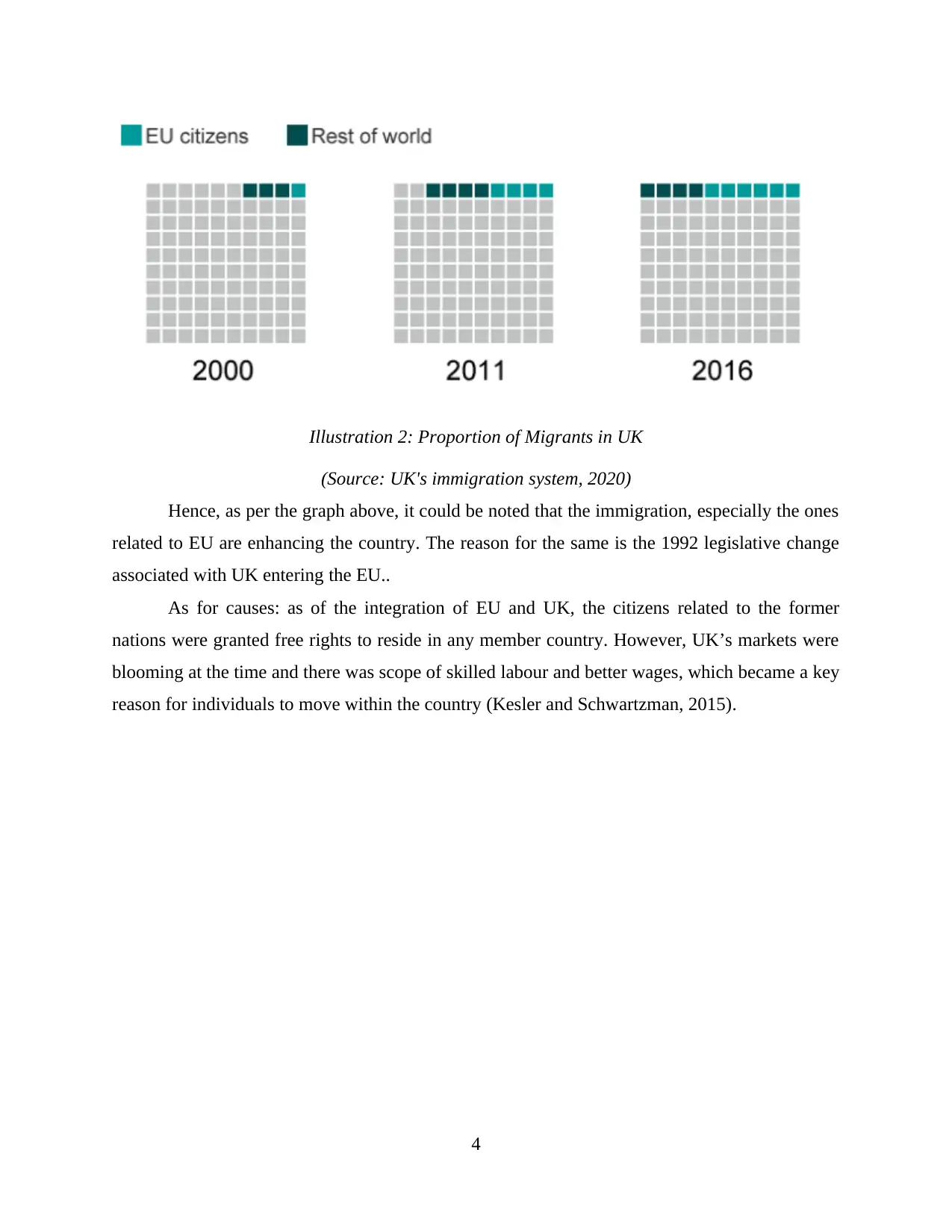
Illustration 2: Proportion of Migrants in UK
(Source: UK's immigration system, 2020)
Hence, as per the graph above, it could be noted that the immigration, especially the ones
related to EU are enhancing the country. The reason for the same is the 1992 legislative change
associated with UK entering the EU..
As for causes: as of the integration of EU and UK, the citizens related to the former
nations were granted free rights to reside in any member country. However, UK’s markets were
blooming at the time and there was scope of skilled labour and better wages, which became a key
reason for individuals to move within the country (Kesler and Schwartzman, 2015).
4
(Source: UK's immigration system, 2020)
Hence, as per the graph above, it could be noted that the immigration, especially the ones
related to EU are enhancing the country. The reason for the same is the 1992 legislative change
associated with UK entering the EU..
As for causes: as of the integration of EU and UK, the citizens related to the former
nations were granted free rights to reside in any member country. However, UK’s markets were
blooming at the time and there was scope of skilled labour and better wages, which became a key
reason for individuals to move within the country (Kesler and Schwartzman, 2015).
4
⊘ This is a preview!⊘
Do you want full access?
Subscribe today to unlock all pages.

Trusted by 1+ million students worldwide
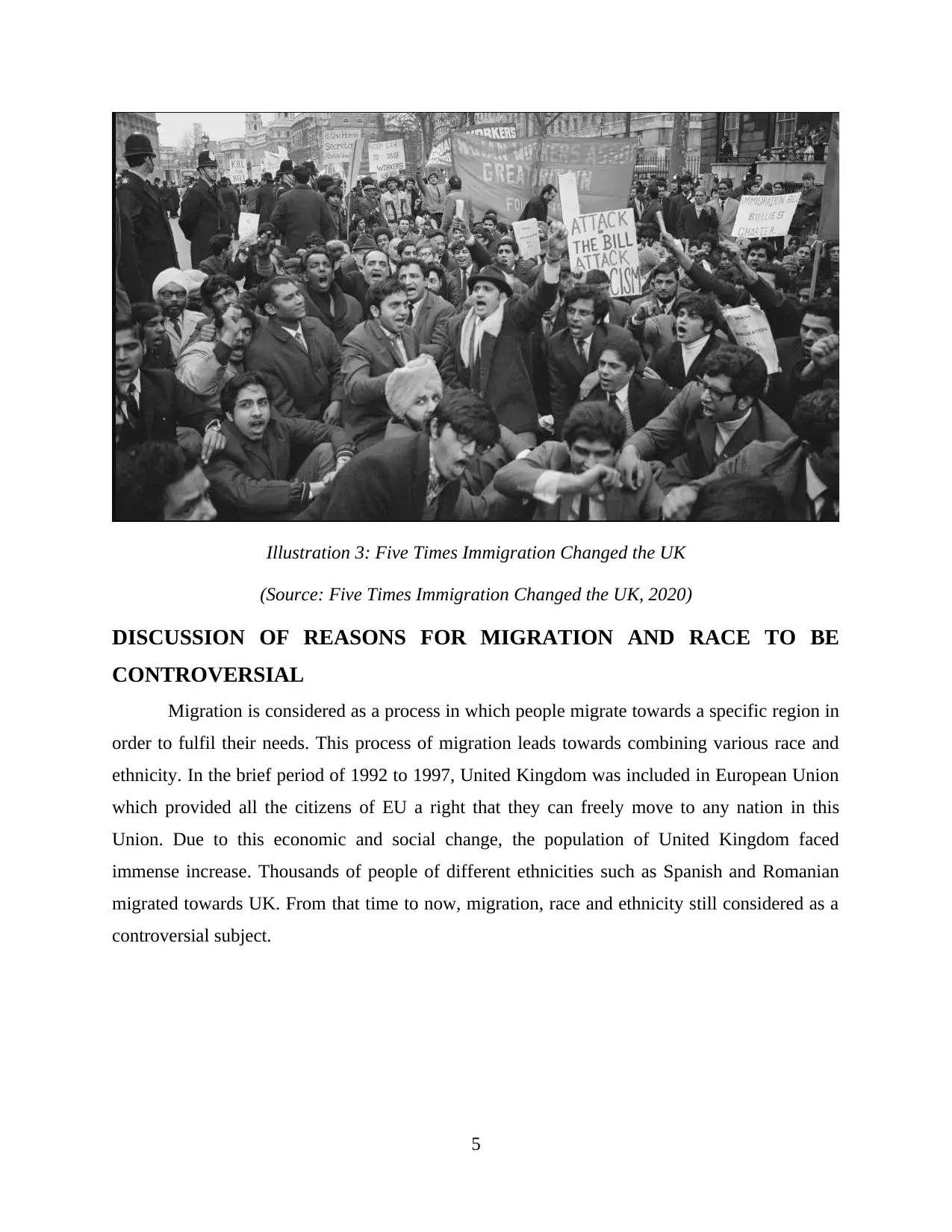
Illustration 3: Five Times Immigration Changed the UK
(Source: Five Times Immigration Changed the UK, 2020)
DISCUSSION OF REASONS FOR MIGRATION AND RACE TO BE
CONTROVERSIAL
Migration is considered as a process in which people migrate towards a specific region in
order to fulfil their needs. This process of migration leads towards combining various race and
ethnicity. In the brief period of 1992 to 1997, United Kingdom was included in European Union
which provided all the citizens of EU a right that they can freely move to any nation in this
Union. Due to this economic and social change, the population of United Kingdom faced
immense increase. Thousands of people of different ethnicities such as Spanish and Romanian
migrated towards UK. From that time to now, migration, race and ethnicity still considered as a
controversial subject.
5
(Source: Five Times Immigration Changed the UK, 2020)
DISCUSSION OF REASONS FOR MIGRATION AND RACE TO BE
CONTROVERSIAL
Migration is considered as a process in which people migrate towards a specific region in
order to fulfil their needs. This process of migration leads towards combining various race and
ethnicity. In the brief period of 1992 to 1997, United Kingdom was included in European Union
which provided all the citizens of EU a right that they can freely move to any nation in this
Union. Due to this economic and social change, the population of United Kingdom faced
immense increase. Thousands of people of different ethnicities such as Spanish and Romanian
migrated towards UK. From that time to now, migration, race and ethnicity still considered as a
controversial subject.
5
Paraphrase This Document
Need a fresh take? Get an instant paraphrase of this document with our AI Paraphraser
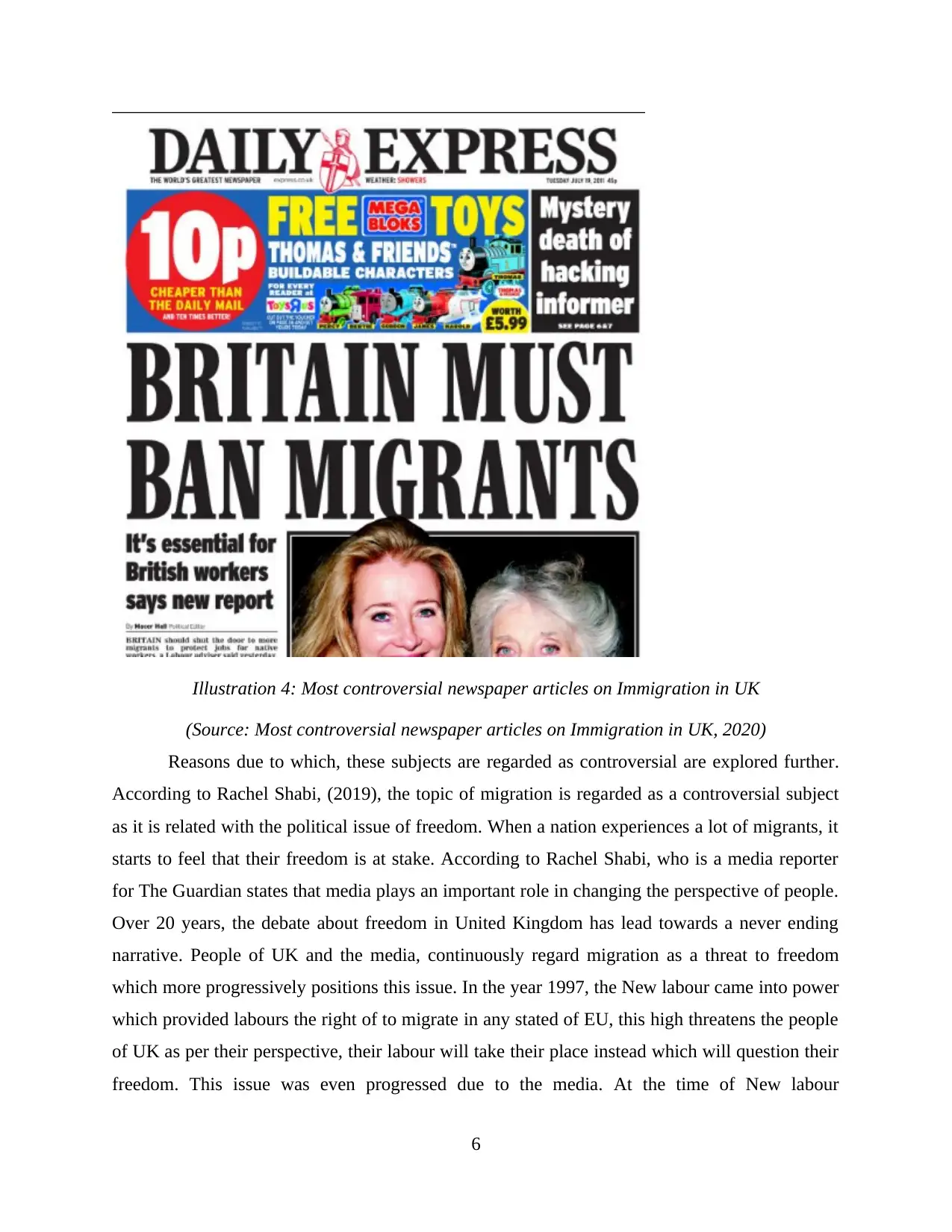
Illustration 4: Most controversial newspaper articles on Immigration in UK
(Source: Most controversial newspaper articles on Immigration in UK, 2020)
Reasons due to which, these subjects are regarded as controversial are explored further.
According to Rachel Shabi, (2019), the topic of migration is regarded as a controversial subject
as it is related with the political issue of freedom. When a nation experiences a lot of migrants, it
starts to feel that their freedom is at stake. According to Rachel Shabi, who is a media reporter
for The Guardian states that media plays an important role in changing the perspective of people.
Over 20 years, the debate about freedom in United Kingdom has lead towards a never ending
narrative. People of UK and the media, continuously regard migration as a threat to freedom
which more progressively positions this issue. In the year 1997, the New labour came into power
which provided labours the right of to migrate in any stated of EU, this high threatens the people
of UK as per their perspective, their labour will take their place instead which will question their
freedom. This issue was even progressed due to the media. At the time of New labour
6
(Source: Most controversial newspaper articles on Immigration in UK, 2020)
Reasons due to which, these subjects are regarded as controversial are explored further.
According to Rachel Shabi, (2019), the topic of migration is regarded as a controversial subject
as it is related with the political issue of freedom. When a nation experiences a lot of migrants, it
starts to feel that their freedom is at stake. According to Rachel Shabi, who is a media reporter
for The Guardian states that media plays an important role in changing the perspective of people.
Over 20 years, the debate about freedom in United Kingdom has lead towards a never ending
narrative. People of UK and the media, continuously regard migration as a threat to freedom
which more progressively positions this issue. In the year 1997, the New labour came into power
which provided labours the right of to migrate in any stated of EU, this high threatens the people
of UK as per their perspective, their labour will take their place instead which will question their
freedom. This issue was even progressed due to the media. At the time of New labour
6
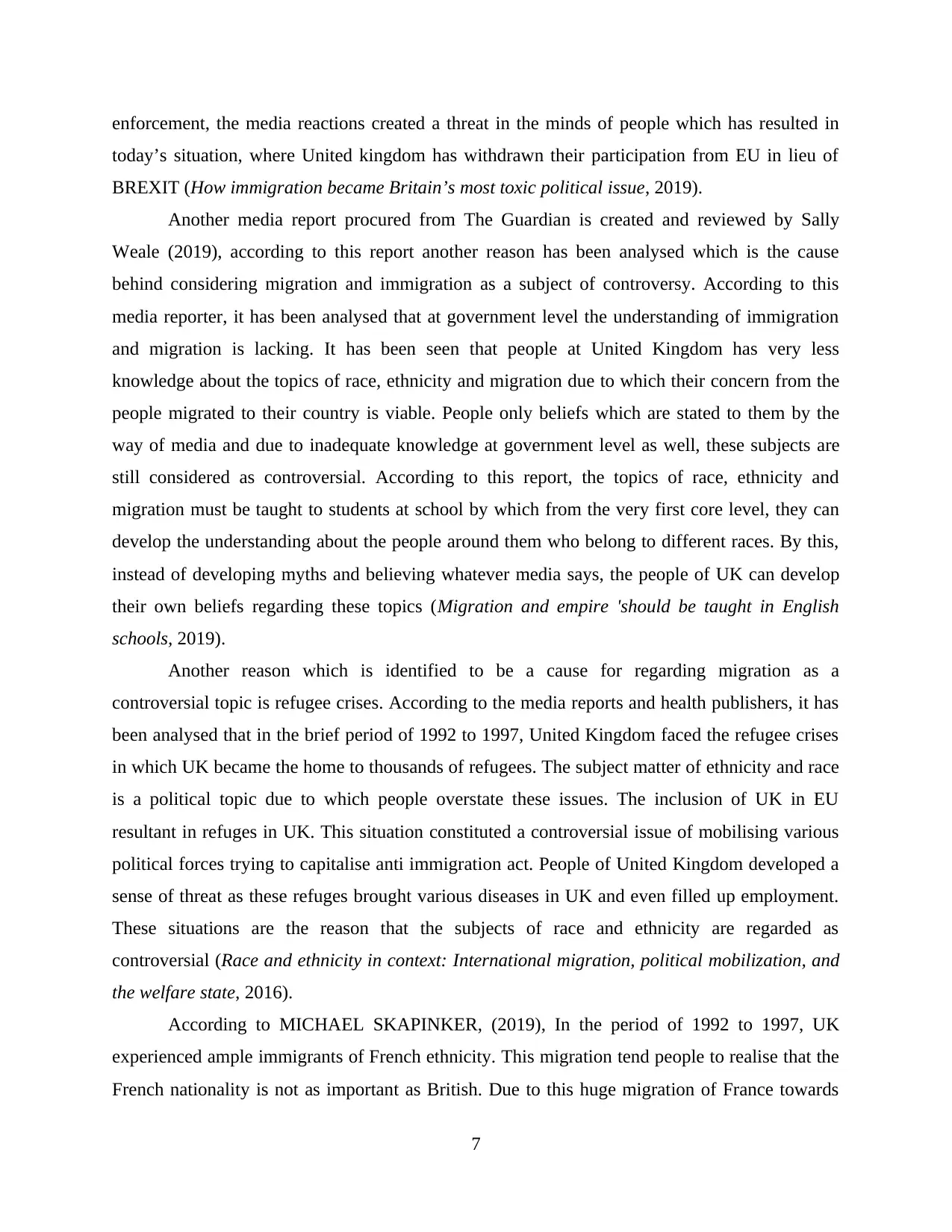
enforcement, the media reactions created a threat in the minds of people which has resulted in
today’s situation, where United kingdom has withdrawn their participation from EU in lieu of
BREXIT (How immigration became Britain’s most toxic political issue, 2019).
Another media report procured from The Guardian is created and reviewed by Sally
Weale (2019), according to this report another reason has been analysed which is the cause
behind considering migration and immigration as a subject of controversy. According to this
media reporter, it has been analysed that at government level the understanding of immigration
and migration is lacking. It has been seen that people at United Kingdom has very less
knowledge about the topics of race, ethnicity and migration due to which their concern from the
people migrated to their country is viable. People only beliefs which are stated to them by the
way of media and due to inadequate knowledge at government level as well, these subjects are
still considered as controversial. According to this report, the topics of race, ethnicity and
migration must be taught to students at school by which from the very first core level, they can
develop the understanding about the people around them who belong to different races. By this,
instead of developing myths and believing whatever media says, the people of UK can develop
their own beliefs regarding these topics (Migration and empire 'should be taught in English
schools, 2019).
Another reason which is identified to be a cause for regarding migration as a
controversial topic is refugee crises. According to the media reports and health publishers, it has
been analysed that in the brief period of 1992 to 1997, United Kingdom faced the refugee crises
in which UK became the home to thousands of refugees. The subject matter of ethnicity and race
is a political topic due to which people overstate these issues. The inclusion of UK in EU
resultant in refuges in UK. This situation constituted a controversial issue of mobilising various
political forces trying to capitalise anti immigration act. People of United Kingdom developed a
sense of threat as these refuges brought various diseases in UK and even filled up employment.
These situations are the reason that the subjects of race and ethnicity are regarded as
controversial (Race and ethnicity in context: International migration, political mobilization, and
the welfare state, 2016).
According to MICHAEL SKAPINKER, (2019), In the period of 1992 to 1997, UK
experienced ample immigrants of French ethnicity. This migration tend people to realise that the
French nationality is not as important as British. Due to this huge migration of France towards
7
today’s situation, where United kingdom has withdrawn their participation from EU in lieu of
BREXIT (How immigration became Britain’s most toxic political issue, 2019).
Another media report procured from The Guardian is created and reviewed by Sally
Weale (2019), according to this report another reason has been analysed which is the cause
behind considering migration and immigration as a subject of controversy. According to this
media reporter, it has been analysed that at government level the understanding of immigration
and migration is lacking. It has been seen that people at United Kingdom has very less
knowledge about the topics of race, ethnicity and migration due to which their concern from the
people migrated to their country is viable. People only beliefs which are stated to them by the
way of media and due to inadequate knowledge at government level as well, these subjects are
still considered as controversial. According to this report, the topics of race, ethnicity and
migration must be taught to students at school by which from the very first core level, they can
develop the understanding about the people around them who belong to different races. By this,
instead of developing myths and believing whatever media says, the people of UK can develop
their own beliefs regarding these topics (Migration and empire 'should be taught in English
schools, 2019).
Another reason which is identified to be a cause for regarding migration as a
controversial topic is refugee crises. According to the media reports and health publishers, it has
been analysed that in the brief period of 1992 to 1997, United Kingdom faced the refugee crises
in which UK became the home to thousands of refugees. The subject matter of ethnicity and race
is a political topic due to which people overstate these issues. The inclusion of UK in EU
resultant in refuges in UK. This situation constituted a controversial issue of mobilising various
political forces trying to capitalise anti immigration act. People of United Kingdom developed a
sense of threat as these refuges brought various diseases in UK and even filled up employment.
These situations are the reason that the subjects of race and ethnicity are regarded as
controversial (Race and ethnicity in context: International migration, political mobilization, and
the welfare state, 2016).
According to MICHAEL SKAPINKER, (2019), In the period of 1992 to 1997, UK
experienced ample immigrants of French ethnicity. This migration tend people to realise that the
French nationality is not as important as British. Due to this huge migration of France towards
7
⊘ This is a preview!⊘
Do you want full access?
Subscribe today to unlock all pages.

Trusted by 1+ million students worldwide
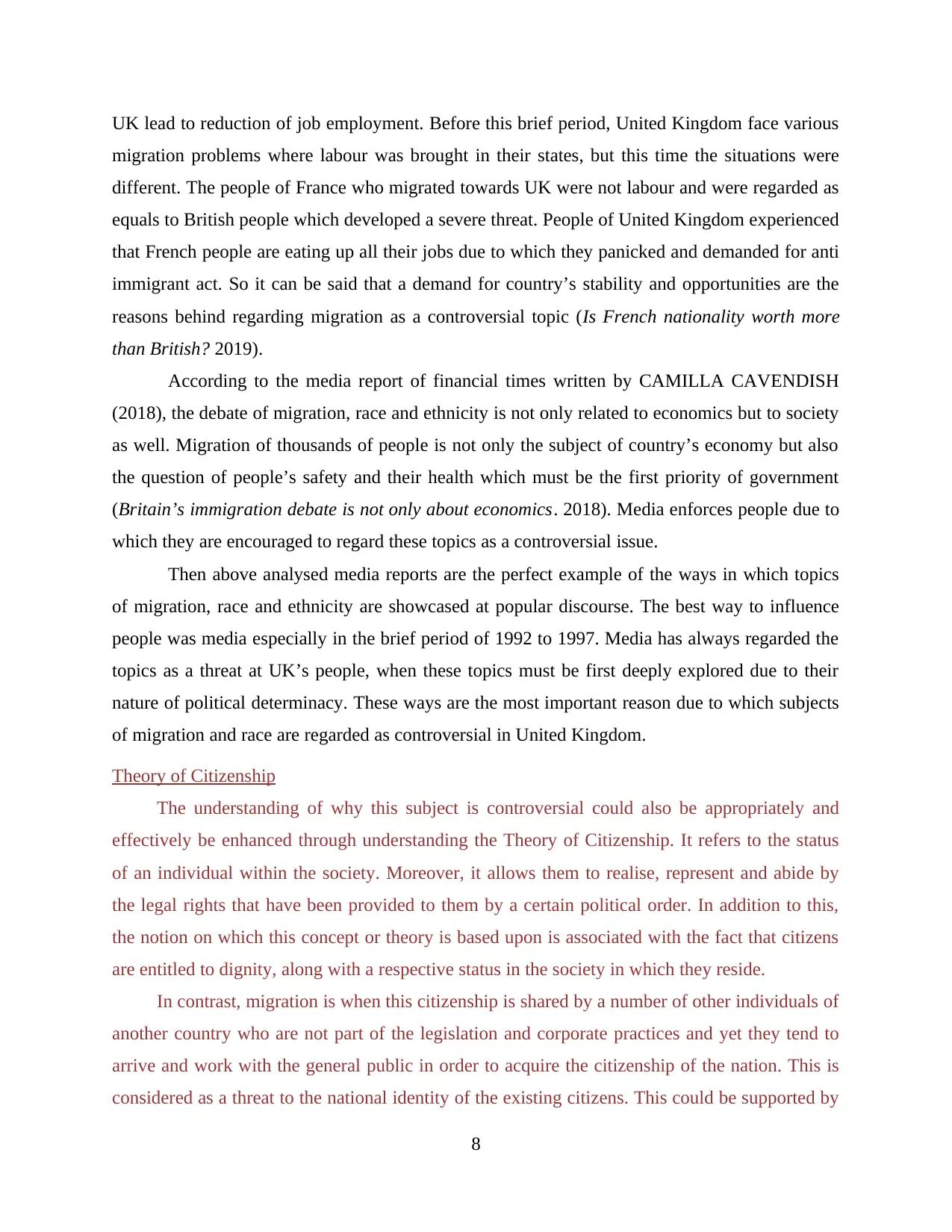
UK lead to reduction of job employment. Before this brief period, United Kingdom face various
migration problems where labour was brought in their states, but this time the situations were
different. The people of France who migrated towards UK were not labour and were regarded as
equals to British people which developed a severe threat. People of United Kingdom experienced
that French people are eating up all their jobs due to which they panicked and demanded for anti
immigrant act. So it can be said that a demand for country’s stability and opportunities are the
reasons behind regarding migration as a controversial topic (Is French nationality worth more
than British? 2019).
According to the media report of financial times written by CAMILLA CAVENDISH
(2018), the debate of migration, race and ethnicity is not only related to economics but to society
as well. Migration of thousands of people is not only the subject of country’s economy but also
the question of people’s safety and their health which must be the first priority of government
(Britain’s immigration debate is not only about economics. 2018). Media enforces people due to
which they are encouraged to regard these topics as a controversial issue.
Then above analysed media reports are the perfect example of the ways in which topics
of migration, race and ethnicity are showcased at popular discourse. The best way to influence
people was media especially in the brief period of 1992 to 1997. Media has always regarded the
topics as a threat at UK’s people, when these topics must be first deeply explored due to their
nature of political determinacy. These ways are the most important reason due to which subjects
of migration and race are regarded as controversial in United Kingdom.
Theory of Citizenship
The understanding of why this subject is controversial could also be appropriately and
effectively be enhanced through understanding the Theory of Citizenship. It refers to the status
of an individual within the society. Moreover, it allows them to realise, represent and abide by
the legal rights that have been provided to them by a certain political order. In addition to this,
the notion on which this concept or theory is based upon is associated with the fact that citizens
are entitled to dignity, along with a respective status in the society in which they reside.
In contrast, migration is when this citizenship is shared by a number of other individuals of
another country who are not part of the legislation and corporate practices and yet they tend to
arrive and work with the general public in order to acquire the citizenship of the nation. This is
considered as a threat to the national identity of the existing citizens. This could be supported by
8
migration problems where labour was brought in their states, but this time the situations were
different. The people of France who migrated towards UK were not labour and were regarded as
equals to British people which developed a severe threat. People of United Kingdom experienced
that French people are eating up all their jobs due to which they panicked and demanded for anti
immigrant act. So it can be said that a demand for country’s stability and opportunities are the
reasons behind regarding migration as a controversial topic (Is French nationality worth more
than British? 2019).
According to the media report of financial times written by CAMILLA CAVENDISH
(2018), the debate of migration, race and ethnicity is not only related to economics but to society
as well. Migration of thousands of people is not only the subject of country’s economy but also
the question of people’s safety and their health which must be the first priority of government
(Britain’s immigration debate is not only about economics. 2018). Media enforces people due to
which they are encouraged to regard these topics as a controversial issue.
Then above analysed media reports are the perfect example of the ways in which topics
of migration, race and ethnicity are showcased at popular discourse. The best way to influence
people was media especially in the brief period of 1992 to 1997. Media has always regarded the
topics as a threat at UK’s people, when these topics must be first deeply explored due to their
nature of political determinacy. These ways are the most important reason due to which subjects
of migration and race are regarded as controversial in United Kingdom.
Theory of Citizenship
The understanding of why this subject is controversial could also be appropriately and
effectively be enhanced through understanding the Theory of Citizenship. It refers to the status
of an individual within the society. Moreover, it allows them to realise, represent and abide by
the legal rights that have been provided to them by a certain political order. In addition to this,
the notion on which this concept or theory is based upon is associated with the fact that citizens
are entitled to dignity, along with a respective status in the society in which they reside.
In contrast, migration is when this citizenship is shared by a number of other individuals of
another country who are not part of the legislation and corporate practices and yet they tend to
arrive and work with the general public in order to acquire the citizenship of the nation. This is
considered as a threat to the national identity of the existing citizens. This could be supported by
8
Paraphrase This Document
Need a fresh take? Get an instant paraphrase of this document with our AI Paraphraser
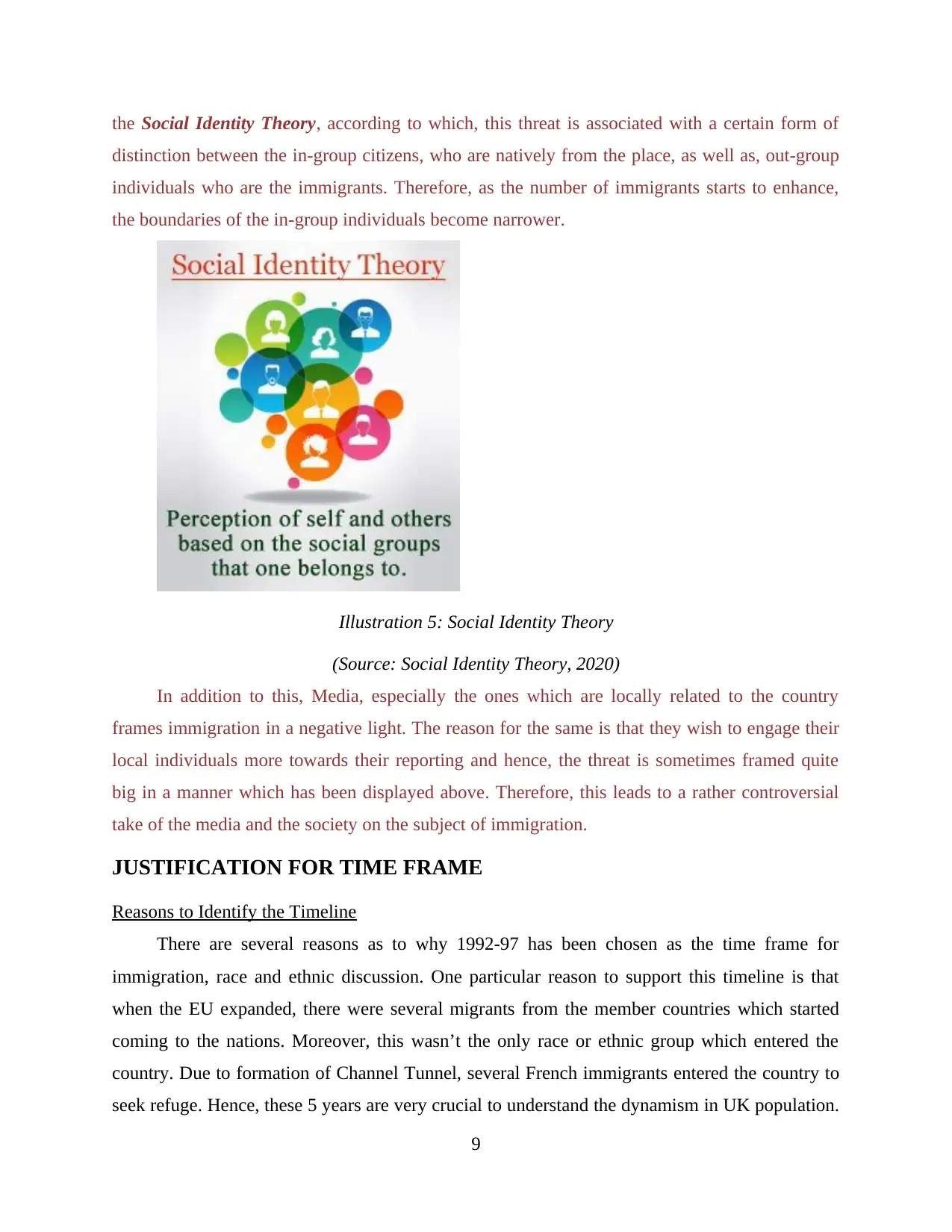
the Social Identity Theory, according to which, this threat is associated with a certain form of
distinction between the in-group citizens, who are natively from the place, as well as, out-group
individuals who are the immigrants. Therefore, as the number of immigrants starts to enhance,
the boundaries of the in-group individuals become narrower.
Illustration 5: Social Identity Theory
(Source: Social Identity Theory, 2020)
In addition to this, Media, especially the ones which are locally related to the country
frames immigration in a negative light. The reason for the same is that they wish to engage their
local individuals more towards their reporting and hence, the threat is sometimes framed quite
big in a manner which has been displayed above. Therefore, this leads to a rather controversial
take of the media and the society on the subject of immigration.
JUSTIFICATION FOR TIME FRAME
Reasons to Identify the Timeline
There are several reasons as to why 1992-97 has been chosen as the time frame for
immigration, race and ethnic discussion. One particular reason to support this timeline is that
when the EU expanded, there were several migrants from the member countries which started
coming to the nations. Moreover, this wasn’t the only race or ethnic group which entered the
country. Due to formation of Channel Tunnel, several French immigrants entered the country to
seek refuge. Hence, these 5 years are very crucial to understand the dynamism in UK population.
9
distinction between the in-group citizens, who are natively from the place, as well as, out-group
individuals who are the immigrants. Therefore, as the number of immigrants starts to enhance,
the boundaries of the in-group individuals become narrower.
Illustration 5: Social Identity Theory
(Source: Social Identity Theory, 2020)
In addition to this, Media, especially the ones which are locally related to the country
frames immigration in a negative light. The reason for the same is that they wish to engage their
local individuals more towards their reporting and hence, the threat is sometimes framed quite
big in a manner which has been displayed above. Therefore, this leads to a rather controversial
take of the media and the society on the subject of immigration.
JUSTIFICATION FOR TIME FRAME
Reasons to Identify the Timeline
There are several reasons as to why 1992-97 has been chosen as the time frame for
immigration, race and ethnic discussion. One particular reason to support this timeline is that
when the EU expanded, there were several migrants from the member countries which started
coming to the nations. Moreover, this wasn’t the only race or ethnic group which entered the
country. Due to formation of Channel Tunnel, several French immigrants entered the country to
seek refuge. Hence, these 5 years are very crucial to understand the dynamism in UK population.
9
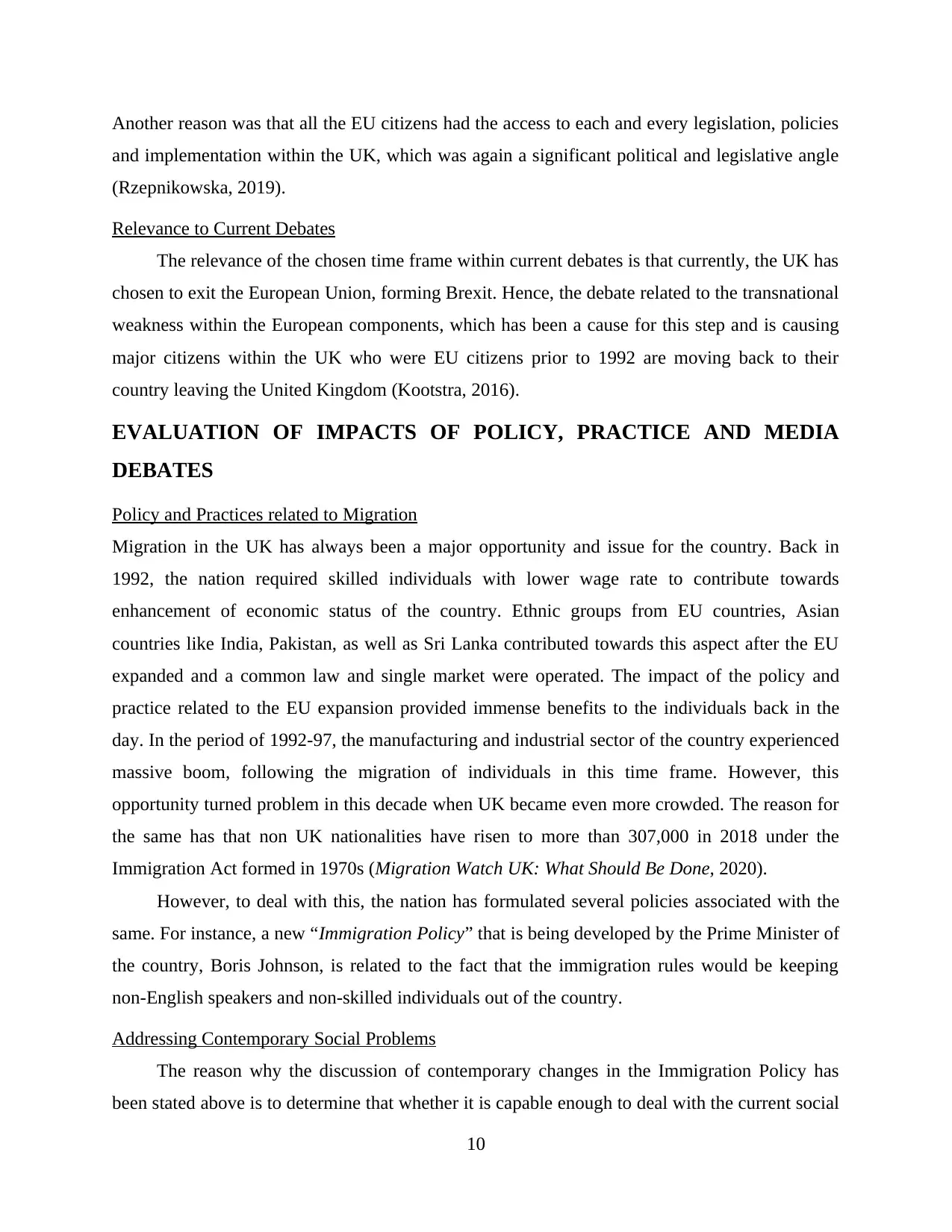
Another reason was that all the EU citizens had the access to each and every legislation, policies
and implementation within the UK, which was again a significant political and legislative angle
(Rzepnikowska, 2019).
Relevance to Current Debates
The relevance of the chosen time frame within current debates is that currently, the UK has
chosen to exit the European Union, forming Brexit. Hence, the debate related to the transnational
weakness within the European components, which has been a cause for this step and is causing
major citizens within the UK who were EU citizens prior to 1992 are moving back to their
country leaving the United Kingdom (Kootstra, 2016).
EVALUATION OF IMPACTS OF POLICY, PRACTICE AND MEDIA
DEBATES
Policy and Practices related to Migration
Migration in the UK has always been a major opportunity and issue for the country. Back in
1992, the nation required skilled individuals with lower wage rate to contribute towards
enhancement of economic status of the country. Ethnic groups from EU countries, Asian
countries like India, Pakistan, as well as Sri Lanka contributed towards this aspect after the EU
expanded and a common law and single market were operated. The impact of the policy and
practice related to the EU expansion provided immense benefits to the individuals back in the
day. In the period of 1992-97, the manufacturing and industrial sector of the country experienced
massive boom, following the migration of individuals in this time frame. However, this
opportunity turned problem in this decade when UK became even more crowded. The reason for
the same has that non UK nationalities have risen to more than 307,000 in 2018 under the
Immigration Act formed in 1970s (Migration Watch UK: What Should Be Done, 2020).
However, to deal with this, the nation has formulated several policies associated with the
same. For instance, a new “Immigration Policy” that is being developed by the Prime Minister of
the country, Boris Johnson, is related to the fact that the immigration rules would be keeping
non-English speakers and non-skilled individuals out of the country.
Addressing Contemporary Social Problems
The reason why the discussion of contemporary changes in the Immigration Policy has
been stated above is to determine that whether it is capable enough to deal with the current social
10
and implementation within the UK, which was again a significant political and legislative angle
(Rzepnikowska, 2019).
Relevance to Current Debates
The relevance of the chosen time frame within current debates is that currently, the UK has
chosen to exit the European Union, forming Brexit. Hence, the debate related to the transnational
weakness within the European components, which has been a cause for this step and is causing
major citizens within the UK who were EU citizens prior to 1992 are moving back to their
country leaving the United Kingdom (Kootstra, 2016).
EVALUATION OF IMPACTS OF POLICY, PRACTICE AND MEDIA
DEBATES
Policy and Practices related to Migration
Migration in the UK has always been a major opportunity and issue for the country. Back in
1992, the nation required skilled individuals with lower wage rate to contribute towards
enhancement of economic status of the country. Ethnic groups from EU countries, Asian
countries like India, Pakistan, as well as Sri Lanka contributed towards this aspect after the EU
expanded and a common law and single market were operated. The impact of the policy and
practice related to the EU expansion provided immense benefits to the individuals back in the
day. In the period of 1992-97, the manufacturing and industrial sector of the country experienced
massive boom, following the migration of individuals in this time frame. However, this
opportunity turned problem in this decade when UK became even more crowded. The reason for
the same has that non UK nationalities have risen to more than 307,000 in 2018 under the
Immigration Act formed in 1970s (Migration Watch UK: What Should Be Done, 2020).
However, to deal with this, the nation has formulated several policies associated with the
same. For instance, a new “Immigration Policy” that is being developed by the Prime Minister of
the country, Boris Johnson, is related to the fact that the immigration rules would be keeping
non-English speakers and non-skilled individuals out of the country.
Addressing Contemporary Social Problems
The reason why the discussion of contemporary changes in the Immigration Policy has
been stated above is to determine that whether it is capable enough to deal with the current social
10
⊘ This is a preview!⊘
Do you want full access?
Subscribe today to unlock all pages.

Trusted by 1+ million students worldwide
1 out of 15
Related Documents
Your All-in-One AI-Powered Toolkit for Academic Success.
+13062052269
info@desklib.com
Available 24*7 on WhatsApp / Email
![[object Object]](/_next/static/media/star-bottom.7253800d.svg)
Unlock your academic potential
Copyright © 2020–2025 A2Z Services. All Rights Reserved. Developed and managed by ZUCOL.





